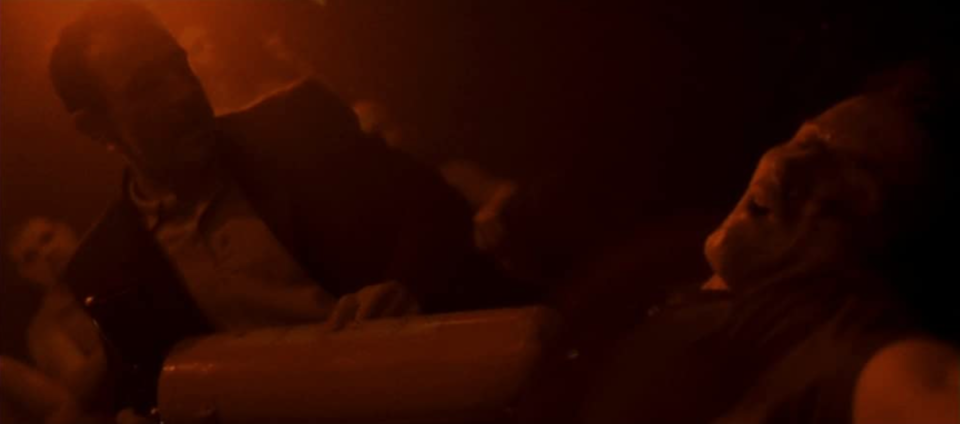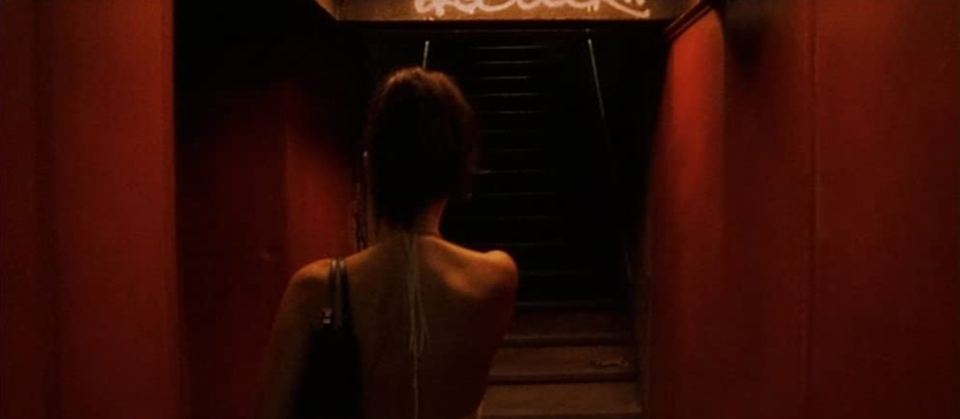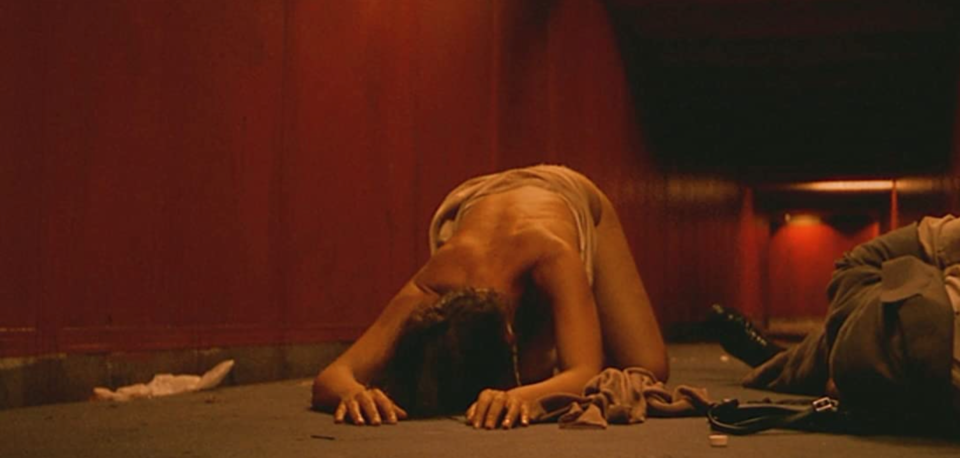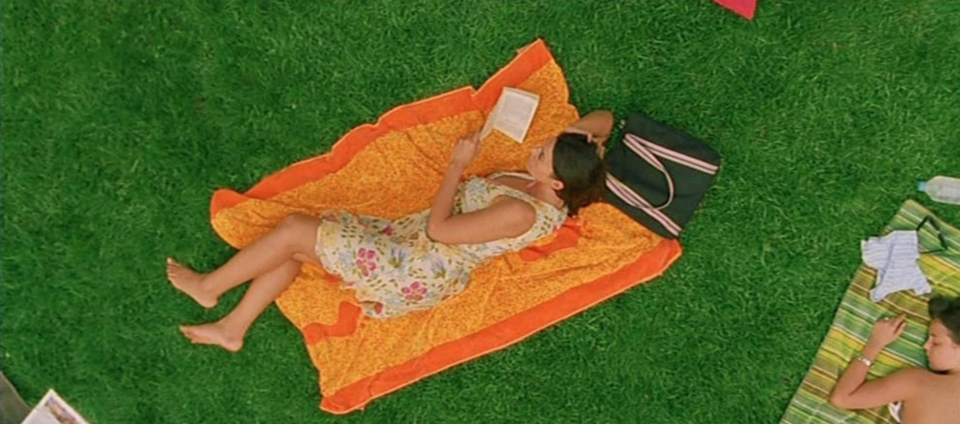Time Heals All Things: Irreversible and Reversing the Trauma of Sexual Assault

Gaspar Noé’s 2002 film Irreversible is known as one of the most disturbing films of all time. Considered a part of the New French Extremity movement, the film doesn’t actually contain much gore. Its extremity lies in a violent murder in the first act and one of the most brutal depictions of sexual assault ever committed to film. The story plays out in real-time with long shots constructed in reverse order that follow a young woman named Alex (Monica Bellucci), her boyfriend Marcus (Vincent Cassel), and her ex-boyfriend Pierre (Albert Dupontel) on a night out in Paris. The centerpiece of the film and the main source of its controversy is a brutal rape scene lasting nearly nine minutes in which Alex is sodomized in a pedestrian tunnel. Vowing revenge, Marcus and Pierre tear through the city looking for the attacker, a vicious pimp called La Tenia (Jo Prestia).
The film’s second half is more subdued. We get to know Alex and Marcus as they spend a quiet afternoon together before joining Pierre at a party. This conclusion, in which we learn that Alex is pregnant with Marcus’s baby, is meant to humanize the couple and show us all that’s been lost. But, it could also serve as an example of trauma recovery.
Responding to claims that audience members had left the theater during the extended rape scene, Noé said, “The fact is that if they stay they will get something that will erase these images.” I would argue that the film’s most brutal scene can never be erased from my memory and I venture many viewers would agree. But contrary to the title, this second act does seem to reverse these images, providing a powerful example of healing. Watching these scenes in reverse feels like watching Alex put herself back together again and find peace by reclaiming her humanity.
The film begins with a description of past trauma as a man describes spending time in prison and raping his own daughter. He is the Butcher (Philippe Nahon), a character from Noé’s previous films Carne and I Stand Alone. These connected stories follow the Butcher as he mistakenly believes his daughter has been sexually assaulted and takes revenge on an innocent man resulting in his imprisonment. In the end, he assaults his daughter and then kills her in a misguided attempt to liberate her from the pain he has caused. This brief scene is a thesis statement for Irreversible, foreshadowing Marcus’s attempts to avenge Alex’s rape and the resulting pain caused by his actions.

The main narrative of the film begins in chaos as Marcus and Pierre track down La Tenia in a club called The Rectum, a problematic depiction of the LGBTQIA+ community that many have rightly flagged as homophobic. Once they’ve located La Tenia, Marcus attacks. His arm is broken in the fight and he is about to be raped himself when Pierre swoops in and pummels the man’s face with a fire extinguisher. Patrons of the club gather around and cheer him on.
This murder is one of the most brutal and realistic death scenes ever filmed. Even more upsetting, Pierre and Marcus have gotten the wrong man. The real La Tenia watches from the crowd smiling with the knowledge that he has gotten away with depravity. His escape is an indictment of the futility of this desire for revenge. Not only have Marcus and Pierre not gotten the justice they seek, but they have also gravely injured themselves as well. Marcus’s arm is broken and Pierre has now become a killer. Like the Butcher, he will likely be going to prison himself.
Next, we meet a sex worker named Concha (Victoria Jaramillo) who witnessed the attack on Alex. As we will later see, Concha is La Tenia’s first victim of the film and he targets Alex after she stumbles upon him attacking her. Concha is understandably afraid to give Marcus and Pierre information about the crime as La Tenia will surely know she is the source of their information. But the men don’t care. Marcus attacks her as well, demanding she put herself in further jeopardy to give him the information he wants. Nearly halfway through the film, the only victims we’ve seen so far are those hurt by Marcus and Pierre. In their search for justice, all they’ve done is cause more pain.
We then back up the story to witness the genesis of their quest. As Alex is wheeled out on a stretcher, Marcus and Pierre are understandably distraught. While they stand in shock, a man approaches them to ask if they want revenge and offers to find the attacker for money. Preying on their pain, he questions Marcus’s masculinity by calling revenge a man’s business. This cuts to the heart of Marcus’s guilt and we will later learn that Alex was walking home alone due to his boorish behavior at the party. How much of his determination for revenge is driven by a desire to assuage his own guilt?
Desperate to prove they can protect the woman they both love, Marcus and Pierre go off on a fool’s errand while Alex goes to the hospital alone. They believe they have failed in the masculine role of protector and run off to reclaim their own power through violence. Unable to bear the sight of her badly beaten body, they make themselves the victims and abandon Alex in her lowest moments.
When she wakes up, she will have no support system. Pierre will probably be arrested for his own crime and Marcus will be injured as well. He will not be able to care for her because he will need help caring for himself. How will she feel when she learns that they used what happened to her as an excuse to hurt others? True strength, true allyship, would be to stay with Alex and confront the reality of what has happened to her while offering the support she will need in her recovery.

Irreversible now shifts to Alex’s point of view, depicting the horrific attack. The camera, constantly in motion throughout the earlier scenes, now stays fixed on Alex’s face as she is raped and beaten on the dirty floor of the tunnel. Noé does not cut away. We are witness to every second of the nearly nine-minute assault. The scene is incredibly difficult to watch with many questioning the need for such extensive violence.
But as a survivor of assault myself, I will always be grateful to Noé for depicting this attack in its entirety. Rape is an incredibly upsetting crime and understandably difficult to talk about. When we do, we use the past tense—“she was raped, she was attacked, she was sodomized”—as if the crime happened in an instant. But rape is not an instantaneous crime. It has a beginning, an interminable middle, and an end.
When real women and men are raped, there is no director standing just out of the frame to yell cut, or artfully pan away when it gets too intense. Real victims of assault feel and experience every minute with no escape except that which we can find for ourselves. It is dehumanizing. It is upsetting, and it can feel like an eternity. We watch the entirety of Alex’s attack in solidarity with her. If she can survive experiencing it, surely we can survive watching it. We bear witness to what is happening to her and we share in her pain.
This scene can be incredibly triggering for survivors of rape and I am certainly not advocating for anyone who has suffered past trauma to watch this scene out of some sort of duty. But I found immense comfort in seeing something I’d experienced depicted with honesty and an absence of shame. The implication that rape is too upsetting to watch tells survivors that it would also be too upsetting for others to hear our stories. For all the times I felt too embarrassed to talk about what happened to me, this scene shows me that I have nothing to be ashamed of. It is a part of my life and not a story too horrific to share. It’s not something that should remain in the shadows or on the cutting room floor. It is a crime that deserves attention.

Sexual assault should make us uncomfortable. Rather than leave the room, turn the channel, or pretend it doesn’t exist, maybe we can use that discomfort to demand change. Instead of saying “Alex was raped” as if the crime happened in a single image we can click away from, we could say “Alex suffered a rape.” That is what Noé is showing us with this nine-minute attack.
He shows us Alex’s suffering and validates its existence. In the aftermath of the assault, we often focus on physical pain. In fact, if no visible injuries exist, it’s easy to make ourselves believe that the crime did not occur at all. By showing us every second of Alex’s experience, Noé makes Alex’s suffering undeniable. Perhaps if more people watched it; if more people understood the ongoing experience of being raped; if more people understood the suffering, the fear, the interminable period of time where you are under the control of an attacker with no end in sight perhaps more people would dedicate themselves to stopping it.
Again, I am not asking survivors of trauma to watch Irreversible. I’m simply asking those who are able to witness this suffering to do so. Because it’s the suffering that will cause us to change. Victims of assault often find themselves leading the charge to change a system that seems designed to enable attackers. We should empower survivors to speak their truths, but this can be incredibly painful. It often feels like ripping open fresh wounds every time we ask someone to care about our stories. If those who have not already suffered could take just a fraction of that burden off of our shoulders, perhaps we could more easily carry the load together. Allyship starts with honoring the suffering; refusing to turn away from a crime that is hard to watch. Because if it’s hard to watch, imagine how hard it is to experience?
The final act of Irreversible follows Alex shortly before the worst moments of her life. While the intent is to cast her as a tragic figure, this could be interpreted as a journey through the process of healing. One of the fundamental elements of trauma therapy is honestly confronting the worst moments. Modalities like EMDR (eye movement desensitization and reprocessing) and Brainspotting are designed to guide survivors through recovering memories we’ve buried because they are too painful to hold in the forefront of our consciousness. We bury them deep within our minds so that we can get through the day. It’s a long and often painful process, but the power in confronting those memories lies in understanding that they are over.
We are no longer in the tunnel with Alex. We’ve been with her as she experiences the most painful, horrifying, and devastating moments of her life and alongside her, we have come out the other side. We now join her as she starts to put her life back together.

The final scene in Irreversible involves Alex reading on a sunny day in the park. We enjoy this beautiful afternoon with her as the camera swirls out of focus, leaving us with a peaceful memory of a woman we’ve come to care about. She will not live in our memory defined by the worst moments of her life, but by this moment in which she has found peace.
In an earlier scene, she describes memories of a red tunnel and Marcus describes a pain in the arm he will later break. These are intended to be moments of deja vu or eerie predictions of the horrors to come. But I choose to interpret them as shadows of trauma leaving the system. After her time in the red tunnel, Alex will never be the same. Like all survivors, she will bear the emotional and physical scars of the attack for the rest of her life, but she has not fundamentally lost the essence of who she is. This is the real Alex, a woman in the park perhaps daydreaming about having a baby.
Due to the reverse narrative of the film, it’s possible to interpret Alex’s journey as a reclamation of a life that was taken from her. This is likely not Noé’s intention. This narrative device was probably intended to compound the tragedy by reminding us of the life Alex could have had. Noé tells us the story backward, but we feel it chronologically. I find it incredibly uplifting to watch Alex experience the very worst I can imagine and then seemingly revert to her true self. If Alex can make it out the other side of her trauma, then so can I.
The film ends with an ominous message, ”Le temps detruit tout (Time destroys all things)” indicating that given enough time we all will end up the victim of incredible suffering. Irreversible shows that it’s up to us to decide how we respond. Marcus and Pierre react to wounds to their ego by creating more pain. My understanding of Alex responds with a fearless dedication to recovery and healing. We stay with her when Marcus and Pierre choose not to. We watch her confront the most painful moments of her life and keep going. I prefer the phrase “Le temps règle tout (Time heals all things)”. It implies that with enough time, we can heal even the most vicious of wounds.
Irreversible depicts some of the most horrific violence in the history of film, but it is violence that happens every day. If we can choose to confront the violent truth Noé shows us, maybe we can begin to heal a world designed to enable it. Given enough time maybe we too can find a way back to the heart of ourselves.
Categorized: News
